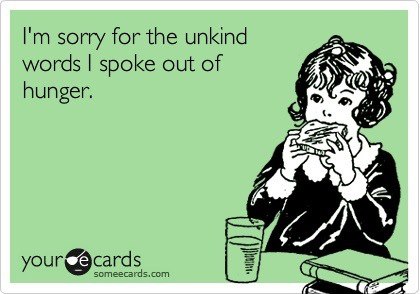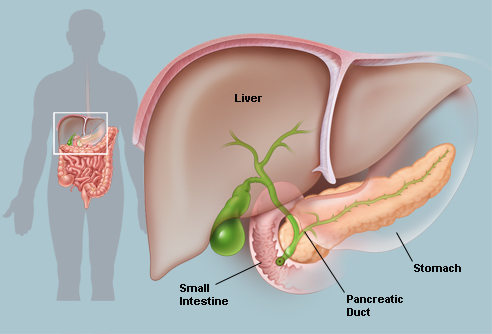I was assigned to do a “media project” for school, so I wrote a blog post. I figured I’d use it for the project and figured I’d use it here too, to help people understand some of the nitty gritty of hangry. I’ll post soon about what do do about it. How to prevent it, or at least lessen the symptoms.
Do you get “hangry”? Some describe this as the feeling of “low blood sugar”, “grumpy hungry” or just plain irritable. You know that time of day when it’s just been too long since you last ate. Huffington Post has an article describing the symptoms and the emotional component added when you get hungry. You’re brain and gut are intricately related and when one needs something, it talks to the other and vice versa. And they usually need the same things, so it works out perfectly.
The avoidance of “hangry” is the biggest argument to eating 5 small meals a day. This comes with the benefits of keeping your insulin levels stable, improving insulin sensitivity and helping prevent diabetes. You avoid the cravings and are less likely to lose your will power. You may remember my previous post called 2 meals and your pancreas where I talked a little about why a few studies showed eating 2 meals might be better for your pancreas as well as weight loss, but if you are trying to avoid the “hangry.” 5-6 small meals is the way to go.
Your liver is supposed to release stored energy when you haven’t eaten in a while to prevent your cells from going hungry. So why do we get this “hangry” feeling? Food provides much more than just calories made from carbs, protein and fat. There are so many other things we get from food. Vitamins and minerals for sure, but eating (or not eating) also triggers the release of hormones and chemicals in the gut and brain. You may have heard of ghrelin, which gives you the feeling of hunger, along with leptin, which is released from adipose tissue when the cells don’t need any more energy.
We have a very complex system of back and forth, push and pull, positive and negative feedback loops going on in our body that are constantly in flux, working to keep things in balance. Ghrelin tells your stomach it wants food, and your hypothalamus has a lot of ghrelin receptors, which causes us to become irritable. This irritability increases focus and determination to get food and used to keep us on track and in pursuit of food. It keeps distractions from getting the best of our body’s primary goal.
We’ve only recently (the last ~12,000 years) had a more constant supply of carbohydrates and food in general. Our relatively new position of having food readily available, and having all our other needs like shelter, warmth, medical care and social status essentially satisfied, allows us to more easily listen to our body’s feelings of hunger. We are no longer running from a predator or having to build shelter before a storm. Our modern day distractions, like paying bills, doing homework, and going to work, aren’t exactly life threatening. We have the time and resources to go to the store and buy food, and listen to our wants.
Most people know it’s a bad idea to go to the grocery store hungry. With all the super palatable foods, those oh-so-delicious dopamine and serotonin releasing foods, it’s no wonder why we get annoyed when we don’t have something to eat. We think it’s deprivation, we claim we’re starving, and we get into arguments about nothing. All because our “blood sugar is low.” That ghrelin can get your brain all fired up and focused, on that one ultimate goal of a satisfying meal. Don’t ignore it if you’re about to get into a heated argument with your spouse or boss. Have a snack, and then have a rational conversation, without the ghrelin induced “hangry”.






